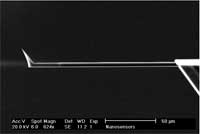NANOSENSORS today announced the introduction of new gold and platinum coated versions of its well-known speciality probe type for Atomic Force Microscopy (AFM) -- the AdvancedTEC™ AFM probe.
 NANOSENSORS AdvancedTEC AFM Probe Side View, Tip, Cantilever and Support Chip
NANOSENSORS AdvancedTEC AFM Probe Side View, Tip, Cantilever and Support Chip
The platinumiridium and the gold coated AdvancedTEC™ AFM probes will be available in different force constants and resonant frequencies for contact mode, non-contact/tapping mode and force modulation mode measurements.
These new variations extend the range of applications for the AdvancedTEC to Electrostatic Force Mode (EFM), Scanning ElectroChemical Microscopy (SECM), Scanning Capacitance Mode (SCM), Scanning Kelvin Probe Microscopy (SKPM) as well as to usage in combined imaging techniques such as: Atomic Force Microscopy (AFM) -- Scanning Electron Microscopy (SEM) imaging, Infra Red -- Scanning Nearfield Optical Microscopy (IR-SNOM) or Electrical Micro-Nanprober systems.
The gold coated AdvancedTEC™ is especially interesting for applications in the fields of biology and life sciences like force spectroscopy, binding force spectroscopy (pull-off measurements) and chemical spectroscopy.
The general advantage of the AdvancedTEC is that this highly doped monolithic silicon probe is designed for precise positioning and high resolution imaging. It features a rectangular cantilever with a triangular free end and a tetrahedral tip that protrudes from the very end of the cantilever. This unique feature allows precise positioning and makes the AdvancedTEC™ the only scanning probe in the world that offers real tip visibility through the optical system of the Atomic Force Microscope -- even when the probe is slightly tilted due to its mounting. This makes it the premium choice for all applications where the tip has to be visible (e.g. nanomanipulation). The patented AdvancedTEC™ Tip is defined by real crystal planes which results in highly reproducible geometries and extremely smooth surfaces. Due to its very small half cone angles this new tip also shows great performance on samples that have a small pattern size combined with steep side walls.
The AdvancedTEC™ is especially interesting for all applications where a direct optical access from top or from the side is necessary in order to be able to illuminate the AFM probe, the AFM tip or the sample simultaneously with the measurement with a laser, electron beam etc.